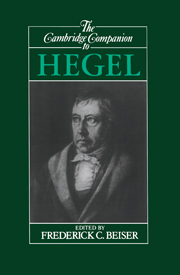Book contents
- Frontmatter
- Introduction
- 1 Hegel's intellectual development to 1807
- 2 You Can't Get There from Here
- 3 Hegel's conception of logic
- 4 Hegel's idealism
- 5 Hegel's dialectical method
- 6 Thought and being
- 7 Hegel's ethics
- 8 The basic context and structure of Hegel's Philosophy of Right
- 9 Hegel's historicism
- 10 Hegel on religion and philosophy
- 11 Hegel's aesthetics
- 12 Transformations of Hegelianism, 1805-1846
- 13 Hegel and Marxism
- 14 Hegel and analytic philosophy
- Bibliography
- Chronology
- Index
9 - Hegel's historicism
Published online by Cambridge University Press: 28 May 2006
- Frontmatter
- Introduction
- 1 Hegel's intellectual development to 1807
- 2 You Can't Get There from Here
- 3 Hegel's conception of logic
- 4 Hegel's idealism
- 5 Hegel's dialectical method
- 6 Thought and being
- 7 Hegel's ethics
- 8 The basic context and structure of Hegel's Philosophy of Right
- 9 Hegel's historicism
- 10 Hegel on religion and philosophy
- 11 Hegel's aesthetics
- 12 Transformations of Hegelianism, 1805-1846
- 13 Hegel and Marxism
- 14 Hegel and analytic philosophy
- Bibliography
- Chronology
- Index
Summary
HEGEL'S HISTORICAL REVOLUTION
History cannot be consigned to a corner in Hegel's system, relegated to a few paragraphs near the end of the Encyclopedia or confined to his Lectures on the Philosophy of History For, as many scholars have long since recognized, history is central to Hegel's conception of philosophy. One of the most striking and characteristic features of Hegel's thought is that it historicizes philosophy, explaining its purpose, principles, and problems in historical terms. Rather than seeing philosophy as a timeless a priori reflection upon eternal forms, Hegel regards it as the self-consciousness of a specific culture, the articulation, defense, and criticism of its essential values and beliefs. This historical conception of philosophy is epitomized clearly by Hegel himself in the famous lines from the preface to his Philosophy of Right: “Philosophy is its own age comprehended in thought” (VII, 26).
- Type
- Chapter
- Information
- The Cambridge Companion to Hegel , pp. 270 - 300Publisher: Cambridge University PressPrint publication year: 1993
- 19
- Cited by

